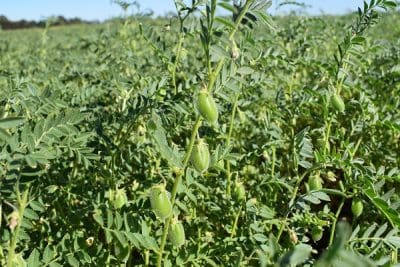This week Grain Central takes a look at the sowing intentions of growers across Australia for the forthcoming winter crop.
Today, Queensland is in the spotlight. Throughout the week, Grain Central will present coverage of what growers are thinking in other states.
CHICKPEAS are set to be the winter crop of choice for many Queensland growers looking for a ‘best-bet’ cash flow option this season as cereal prices continue to languish and dry conditions stifle summer crop production.
The key grain-growing regions of Central Queensland (CQ) and the Darling Downs are desperately dry for this time of year and will need substantial rain before there’s any chance of sowing in a few weeks’ time.
If the rains come, agricultural consultant, Graham Spackman, Emerald, expects a big winter crop to go in in CQ with the focus likely to be on chickpeas.
“A lot of growers have done very well out of chickpeas the last two years. Last year, for most growers it was a spectacular year for chickpeas. Wheat was also good, although not as profitable because the prices were low,” he said.
“The other factor is there is very little summer crop in. We have had a very dry summer. There is very little sorghum in, and only a few paddocks of mung beans.
“Normally we would be going into the autumn with a reasonably good (soil moisture) profile and wouldn’t need much rain to top it up to plant. The difference this time is we haven’t had a summer to restore our profile.
“The Southern Highlands had some good rain about 10 days ago, so that is a good start, but we will need more. The rest of the area from Emerald north will definitely need rain.”
Mr Spackman said with a big chickpea crop in the region last year, growers would need to be mindful of the limitations that imposed on their rotations.
“A lot of growers will only be planting chickpeas on wheat stubble or fallows. But we expect there will be some back-to-back chickpeas, which is a very risky practice and not something the industry condones,” he said.
Despite the interest in chickpeas, Mr Spackman said there would still be a substantial area of wheat go in, particularly into chickpea stubble from last year.
“I think the strategy for a lot of people will be that they will maximise their chickpea area in sensible rotations and wheat will be going into a lot of the chickpea stubble. But all of this is weather permitting,” he said.
Mr Spackman said in CQ chickpeas should preferably be planted in May, or the end of April at the earliest.
Wheat usually goes in in early April in the northern areas and mid-April to the end of May the further south through the Highlands.
It is a similar story in southern Queensland on the Darling Downs.
AgForce Grains president, Wayne Newton, said pricing would be the key driver of crop choice for growers – “so therefore chickpeas will be top of the hit parade again”.
“We have had a couple of big years in a row for chickpeas. Last year was the biggest of the lot. This year early indications are there is certainly a lot of interest from growers in chickpeas, given the relative pricing between chickpeas and wheat/barley. All the cereal grains prices are still quite soft,” he said.
“Chickpea prices have softened this year from what they were last year, but it is a price relativity thing. Chickpeas in excess of $600/tonne are still looking pretty damn good when you are looking at wheat only $200-$250/t. The relative yields are making chickpeas attractive to growers.
“There is still time to see if there are any serious weather scares in production (overseas), but having said that, the actual amount of grain carried over and in store around the world is going to have a continuing depressive effect on the cereals market. The world has been too good at growing grain over the last year or two.”
Mr Newton said with many growers producing big chickpea crops in the last couple of years, there would be implications for fitting chickpeas into rotations this year.
“Disease became a significant issue with chickpeas last season, particularly in southern Queensland. Growers will have to be more mindful of that in this coming year and manage their rotations to minimise the potential risk of disease,” he said.
Mr Newton said low stored soil moisture levels were now a potentially limiting factor to this season’s winter crop planting.
“A lot of the production areas haven’t had very much summer rain and a lot of profiles are still very low in moisture. There are a lot of growers hoping for some significant weather events in the next few weeks to get things rolling,” he said.
“Some people have moisture where there have been some very good summer storms. But some growers still have big cracks in their soil from harvest time. They are a long way from having a profile likely to sow a winter crop.”
Grain Central: Get our free daily cropping news straight to your inbox – Click here
Mr Newton said while Queensland’s south-western regions would start planting in late April if they had the moisture, growers further in on the Darling Downs wouldn’t get going until May, and planting in the more frost-prone areas wouldn’t happen until June.
He said there would be some interest in faba beans, but very little canola would go in in Queensland as it was not well suited agronomically to most regions.
“It has a lot to do with how quickly our springs warm up in a lot of years. We go from having frost to having days well over 30 degrees too quickly to get a long enough flowering and seed set with canola. It can almost happen within a week here,” he said.
“They are constraints. While you are having frost you won’t get seed set, and once you get days well up into the 30s you don’t get seed set. There has been a number of growers dabble with canola over the years with small blocks grown on the south-eastern Downs where it is a little bit milder, but significant commercial volumes are a non-event.”






HAVE YOUR SAY